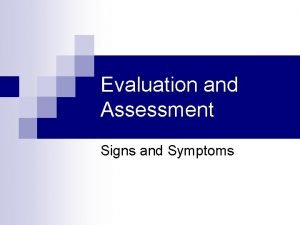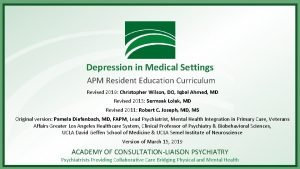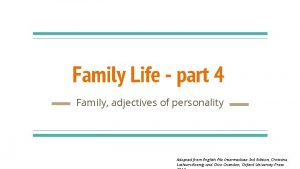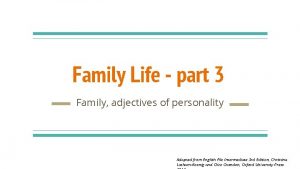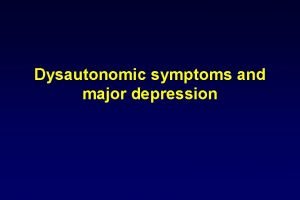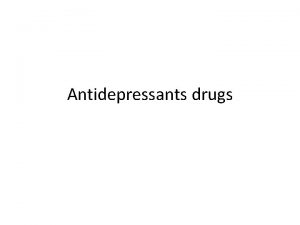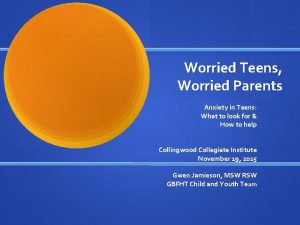Depression Depression Symptoms in Children Teens Younger Children








- Slides: 8

Depression

Depression Symptoms in Children & Teens: Younger Children: sadness, irritability, clinginess, worry, aches & pains, refusing to go to school, or being underweight. Teens or Younger Adults: Sadness, irritability, feeling negative and worthless, anger, poor performance or poor attendance at school, feeling misunderstood and extremely sensitive, using recreational drugs or alcohol, eating or sleeping too much, self-harm, loss of interest in normal activities, and avoidance of social interaction.

Depression vs. Sadness… � https: //www. youtube. com/watch? v=b. CI 68 If. Y 0 D 8

Causes: � Biological Differences: People with depression have physical changes in the brain. � Brain Chemistry: Changes in function and the effect of neurotransmitters in the brain. � Hormones: Changes in the body’s balance of hormones. � Inherited Traits: Depression is more common in people whose blood relatives have the condition.

Risk Factors: Factors that may increase the risk of developing or triggering depression include: � Low self-esteem, being too dependent, self-critical or pessimistic. � Traumatic or stressful events, such as physical or sexual abuse, the death or loss of a loved one, a difficult relationship, or financial problems. � Blood relatives with a history of depression, bi-polar disorder, alcoholism or suicide.

Risk Factors Cont. : � Being lesbian, gay, bisexual or transgender, or having variations in the development of genital organs that aren’t clearly male or female (intersex) in an unsupportive situation. � Abuse of alcohol or recreational drugs. � Serious or chronic illness, including cancer, stroke, chronic pain or heart disease. � History of other mental health disorders, such as anxiety disorder, eating disorders or post traumatic stress disorder.

Complications: � Depression often gets worse if untreated, resulting in emotional, behavioral and health problems that can impact the following areas of your life: *weight gain, which can lead to heart disease and diabetes *pain or physical illness *alcohol or drug misuse *anxiety, panic disorder or social phobia *family conflicts, relationship difficulties, and work or school problems *suicidal feelings, suicide attempts or suicide *social isolation *self-mutilation, such as cutting

Classroom Strategies: � Develop a working and collaborative relationship with the depressed student. � Avoid negative strategies such as punishment, ignoring or sarcasm, as they just tend to reinforce negative feelings of incompetence and low self-esteem. � Implement classroom accommodations such as giving more time, breaking assignments into smaller pieces, offering extra help in setting up schedules or study habits, or pairing the student with others who express an interest in helping may ease academic stress for the student. � Arrange experiences so that the student can be successful and be recognized for successes.
